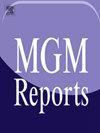Arginase deficiency in Mexico: Insights from the experience of a metabolic reference center
IF 1.9
4区 医学
Q3 GENETICS & HEREDITY
引用次数: 0
Abstract
Arginase deficiency (ARG1d) is an inborn error of metabolism caused by pathogenic variants in ARG1 gene, which causes a defective hydrolysis of arginine (Arg) to urea and ornithine. The molecular landscape of ARG1d in Mexico is poorly known. In this study, we present for the first time the clinical and genotypic overview of the largest cohort of ARG1d in Mexico. A retrospective analysis of the medical records of 24 ARG1d patients from a historical cohort of individuals with inborn errors of intermediary metabolism (1994–2024) from the National Institute of Pediatrics in Mexico City, was performed. Clinical, demographical, biochemical, anthropometric and molecular data were investigated in two moments, at diagnosis and at the last follow-up evaluation. It was found that only 7/24 patients were diagnosed by newborn screening (NBS). Additionally, we highlight the presence of the Portuguese NM_000045.4(ARG1):c.61C>T or p.(Arg21*) variant as the most frequent cause of ARG1d in Mexico, carried by 27.7 % of the patients. Our findings emphasize the debilitating and progressive nature of ARG1d, the prolonged diagnostic odyssey experienced by the patients (6.7 years), and the importance of training healthcare professionals to recognize the clinical features suggestive of the disease. We also underscore the critical need to advance early detection through expanded NBS in our country, as the early-diagnosed patients exhibited less severe outcomes and improved nutritional status compared to late-diagnosed ones. It was also noted that Mexican ARG1d patients have significant difficulties adhering to current nutritional treatment, and access to ammonium scavengers, thus other therapeutic options could be desirable.
精氨酸酶缺乏症在墨西哥:从代谢参考中心的经验见解
精氨酸酶缺乏症(ARG1d)是一种由ARG1基因致病性变异引起的先天性代谢错误,导致精氨酸(Arg)水解为尿素和鸟氨酸的缺陷。ARG1d在墨西哥的分子景观鲜为人知。在这项研究中,我们首次介绍了墨西哥最大的ARG1d队列的临床和基因型概述。回顾性分析了来自墨西哥城国家儿科研究所的24例先天性中间代谢错误的ARG1d患者的医疗记录(1994-2024)。临床、人口学、生化、人体测量和分子数据在诊断时和最后随访评估时进行了调查。通过新生儿筛查(NBS)诊断的患者仅有7/24。此外,我们强调葡萄牙NM_000045.4(ARG1):c.61C>;T或p.(Arg21*)变异是墨西哥ARG1d最常见的原因,27.7%的患者携带该变异。我们的研究结果强调了ARG1d的衰弱性和进行性,患者经历了漫长的诊断过程(6.7年),以及培训医疗保健专业人员识别提示疾病的临床特征的重要性。我们还强调了通过扩大国家统计局在我国推进早期发现的迫切需要,因为与晚期诊断的患者相比,早期诊断的患者表现出较轻的严重后果和改善的营养状况。还指出,墨西哥ARG1d患者在坚持目前的营养治疗和获得铵清除剂方面存在重大困难,因此可能需要其他治疗选择。
本文章由计算机程序翻译,如有差异,请以英文原文为准。
求助全文
约1分钟内获得全文
求助全文
来源期刊

Molecular Genetics and Metabolism Reports
Biochemistry, Genetics and Molecular Biology-Endocrinology
CiteScore
4.00
自引率
5.30%
发文量
105
审稿时长
33 days
期刊介绍:
Molecular Genetics and Metabolism Reports is an open access journal that publishes molecular and metabolic reports describing investigations that use the tools of biochemistry and molecular biology for studies of normal and diseased states. In addition to original research articles, sequence reports, brief communication reports and letters to the editor are considered.
 求助内容:
求助内容: 应助结果提醒方式:
应助结果提醒方式:


